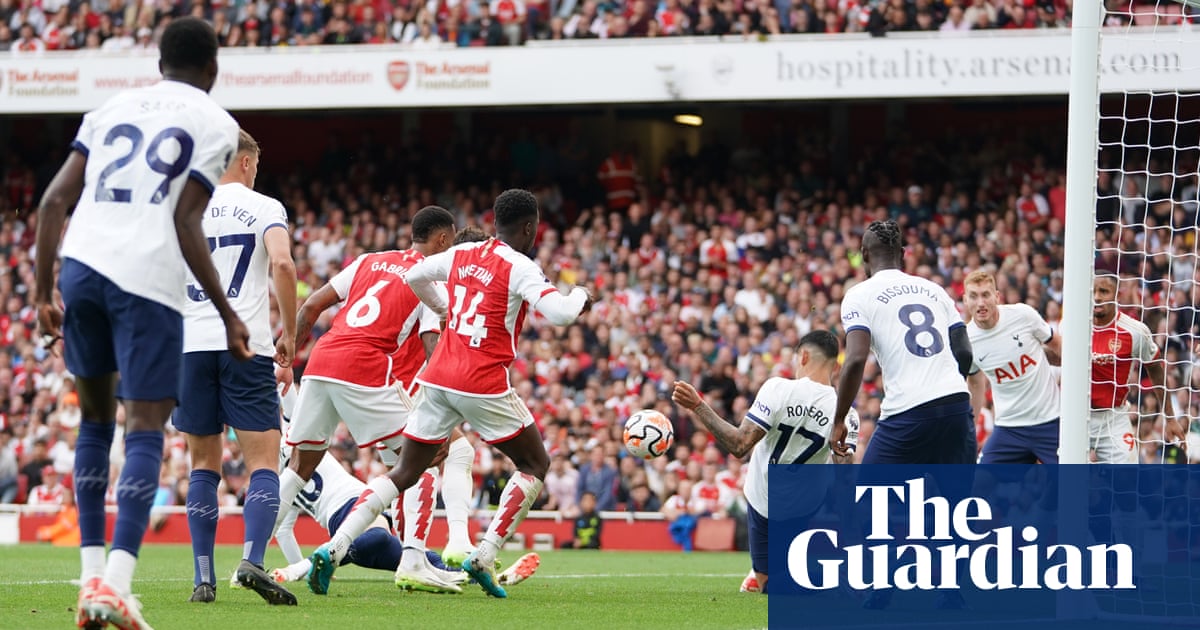
Embarrassing. After another weekend of controversial VAR decisions, it would seem the only appropriate word. Yes, expectations are unduly high. Yes, everyone makes mistakes. But at the end of the day it’s not brain surgery: when Jermaine Jenas got his phone out to call the referee Rob Jones a “sh**house”, he should have taken a deep breath, counted to 10, then walked away.
Jenas, the BBC pundit and pre-season face of – you couldn’t write it – an Football Association campaign to promote respect for referees, has made himself look permanently stupid. Just another weekend in the Barclays, you might say. But Jenas’s error-strewn social media message (full text: “Complete sh**house off a referee! They’re all ruining the our game!”) is hardly atypical. People are losing their stuff at refereeing decisions on a weekly basis.
The central controversy this week affected Tottenham, Jenas’s former side, who conceded a penalty to Arsenal in the north London derby after Cristian Romero blocked a goal-bound shot from Ben White. Initially, Jones chose not to give the spot-kick but, after lengthy consideration by the VAR Paul Tierney, Jones was advised to visit his monitor, where he duly overturned his decision, allowing Arsenal to take a 2-1 lead which they held on to for all of a minute.
Speaking after the match the Spurs manager, Ange Postecoglou, offered up a view of the decision that was a degree more measured than Jenas’s, but still critical. “I couldn’t see it but I’ve got no idea about the handball rule,” he said. “I really don’t. It just seems if it hits your hand it’s a penalty, and then other times if it hits your hand, it isn’t a penalty. It is the one rule in the game I just don’t understand. Unless we start developing armless defenders I don’t know how you are supposed to block things and be in a natural position.”
With those last two words Postecoglou gets to the heart of what’s heating people up about handball decisions. Under Law 12 of the game, a player can be penalised for handling if the ball hits their arm in a position where it is judged to have made the player’s body shape “unnaturally bigger”. That’s a difficult concept to get your head around. What is naturally big after all? And does the definition of bigness change if the body is falling? Or leaping? Or simply standing still?
The law says that it does. A body can be unnaturally big if its size is not “a consequence of, or justifiable by, the player’s body movement for that specific situation”. Furthermore, guidance on the application of the rule, shared with Premier League officials by the referees body Professional Game Match Officials Limited (PGMOL) at the start of the season said that “unnaturally bigger” was also something influenced by whether the player “takes a risk” in putting their arm where it might be hit.
These are all factors a referee has to take into consideration, in pretty much a split-second, before making a call that could drive any number of ex-pro pundits doolally. There’s more to consider, too: according to the PGMOL guidance, the proximity of the player to the shot should be taken into account, as should the subsequent trajectory of the ball after it has hit the arm.
All of these considerations are subjective. A referee is going to form an opinion that is their own and they will only be asked to reconsider it if the VAR believes they have made a “clear and obvious” error. That VAR call is subjective, too, even if PGMOL demands a high bar for intervention (this is one of the reasons it takes time to make an overturn call, the VAR has to be as sure as they can be that an error has been made).
On Romero’s block the decision was taken by Tierney that the defender’s body shape was bigger, it was not justifiable by his position, that he was not close enough for proximity to be a mitigation and that the ball had been sent in a new direction by the Argentine’s intervention. Inside PGMOL on Monday there were no doubts that, ultimately, a penalty was the correct decision.
Controversy over VAR and refereeing decisions will not go away. Even in instances that are not subjective, such as whether a player is offside or not, there will be strong opinions. To call for supporters and pundits to remember that officials are human beings with challenging jobs and that mistakes are inevitable would seem like howling into the wind at this point. But as Jenas apologised on Monday for letting his “emotions get the better of me”, it’s worth noting that it’s not just referees who make mistakes now and again.












